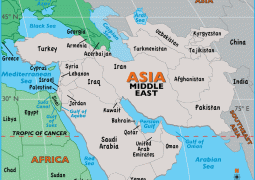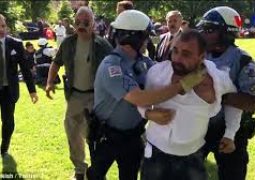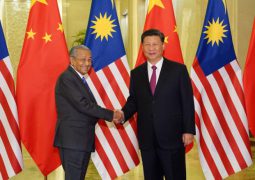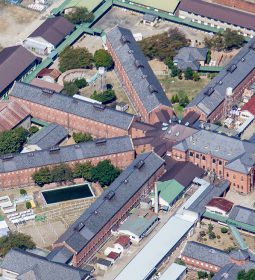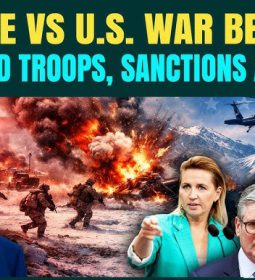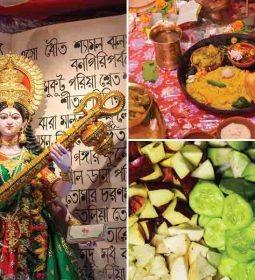Indian Elections: Kashmir Votes
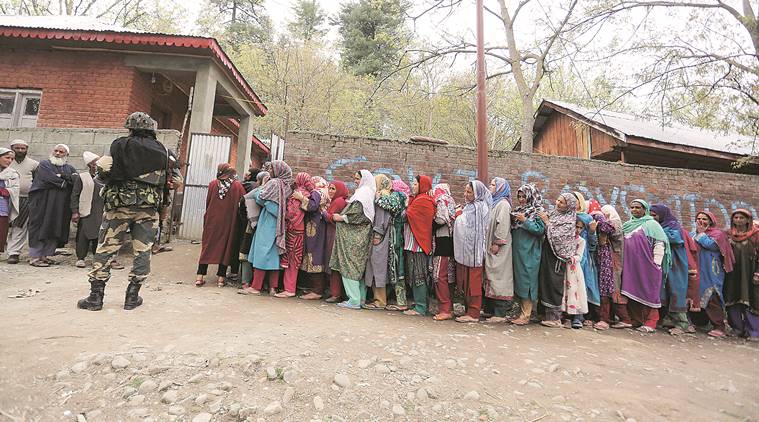
Indian Elections: Kashmir Votes
Amid a tense security situation, Kashmiris are largely unenthused by the national elections.
By Um Roommana
April 22, 2019
Last week on April 11, India commenced its month-long national election process, with different parts of the country voting in seven phases for the lower house of the Indian parliament, the Lok Sabha. In the Kashmir Valley, elections are being held in five phases, with north Kashmir’s Baramulla voting on April 11 and Srinagar on April 18. Voter turnout in both the constituencies varied between average to moderate — 34.7 percent in Baramulla and 14.8 percent in Srinagar.
In fact, this voter turnout was much better than during the 2017 by-elections for Srinagar constituency, when an abysmal 7 percent turnout was witnessed amid violent protests. That poor voter turnout and violence resulted in an indefinite postponing of by-elections for the Anantnag constituency in south Kashmir – in the end, the polls never took place. It will be a greater challenge for the authorities to conduct elections peacefully for Anantang’s seat on April 23, April 29, and May 6. It will also be a litmus test for mainstream parties in Kashmir, such as the National Conference (NC) and the People’s Democratic Party (PDP).
Since 2016, Anantnag has been the hub of protests, with almost daily occurrences of anti-India street protests and violence. While it may appear business as usual in the town, below the surface there is evident anger among the locals against the central government led by the Bharatiya Janata Party (BJP) and the previous state government, an alliance between the BJP and PDP led by then-Chief Minister Mehbooba Mufti.
In 2017, when by-elections had been scheduled for Anantnag, PDP had fielded Tasaduq Mufti, brother of Mehbooba Mufti. But this time the party is taking no chances and has fielded Ms. Mufti herself as the candidate. Her primary challenge is to restore the PDP’s credibility in her home constituency.
In 2014, during the state assembly election campaign, the PDP had campaigned to block Kashmir’s doors for the BJP. However, post-election, the party supremo Mufti Mohammed Sayeed showed no hesitation in doing a U-turn and quickly joined hands with the BJP. When Mehbooba Mufti took over the reins of the PDP after Sayeed’s death, she too continued the alliance, earning her lots of criticism. The coalition with BJP resulted in the PDP losing credibility in the Kashmir Valley, and particularly angered her support base in Anantnag.
“That was the biggest mistake the PDP made. By now, the party has almost lost ground. It’s not only the PDP but people in the Valley have lost faith in the overall democratic process,” Showkat Bashir, a local from South Kashmir, told The Diplomat.
Now as she makes a whirlwind tour of the villages in Anantang, Mufti’s election campaign has made no bones about how the coalition was an arrangement of political convenience, rather than one based on principles. Yet the anger remains. On Monday, April 15, people in the Bijbehara area of Anantnag pelted stones on Mufti’s motorcade when she was returning after visiting a local shrine.
People still hold the PDP responsible for Kashmir’s current precarious situation. Many castigated Mufti for not doing enough when her alliance partner, the BJP, dredged up multiple contentious issues – a beef ban; the abrogation of Articles 35A and 370 from the Indian Constitution, which give special status to Kashmir; and the settlement of Hindu refugees in the state. Many say that this divisive agenda of the BJP has polarized the state of Jammu and Kashmir, bringing to the forefront the state’s regional fault lines – a Hindu majority Jammu, a Buddhist majority Ladakh, and Muslim majority Kashmir Valley – each with competing regional aspirations.
It’s an issue that resonates with ordinary Kashmiris. Ghulam Nabi Malik, a leader of the Communist Party of India (Marxist), in a statement claimed that “Like the rest of the country, the BJP polarised J&K also for its petty electoral gains. Violence has increased manifold, while the social fabric of the state is in tatters.”
Pertinently, elections are taking place in Kashmir while the security situation in the region is at a critical moment, particularly after the deadly suicide bombing in Lethpora, Pulwama on February 14. That attack targeted a Central Reserve Paramilitary Force convoy and killed over 40 personnel. It was the deadliest terrorist attack on the Indian security forces in decades and sparked a near-military confrontation between India and Pakistan, an intensified crackdown on militants and their supporters in Kashmir Valley, and provoked a wave of targeted attacks against Kashmiris in other parts of India.
Anxious to avoid a repetition of the Pulwama attack, which can potentially cause fierce electoral backlash, authorities have left nothing to chance in Kashmir. As part of the enhanced security measures, recently the state government barred civilian traffic two days a week — Wednesdays and Sundays — until May 31, with movement being allowed only for the security forces. In the decades-long conflict, it is the first time that this type of order banning civilian movement has been imposed. As expected, this order has sparked uproar in the Valley, with many criticizing the move and attributing it as one more reason for the alienation of the Kashmiris.
This has inconvenienced many locals including private and government employees, students, patients, and businessmen, who depend on the highway for travel to various parts of the valley.
“We are facing problems due to the highway closure as we used to go home on weekends. Also many less students attend classes on Wednesdays as they commute daily to university,” Yasir Rather, a student from Anantnag, told The Diplomat.

Recently a video surfaced on social media in which an ambulance was allegedly forced to wait to permit the passage of security vehicles. As per reports, the patient inside, who was on oxygen, was kept waiting for 30 minutes.
“The closure of the highway is part of militarization in Kashmir. This is not normal in any working democracy. The local government doesn’t have power over security but there will be influence to some extent on these types of orders,” Noor Ahmad Baba, a political scientist, told The Diplomat.
Opposition politicians have also condemned the move. “Security of the forces is paramount but at the same time traffic between Kashmir and Jammu is equally important. I think the government should have found a solution like half day usage of road for both instead of completely shutting it down for two days in a week,” said Ghulam Nabi Azad, a senior Congress politician and former chief minister.
Meanwhile, post-Pulwama militants have kept up with their activities, showing no signs of keeping a low profile. They have warned locals against participating in the elections. In separate audio messages from two militant outfits operating in Kashmir, Hizbul Mujahideen commander Riyaz Naikoo and Zakir Musa of Ansar Gazwat-ul-Hind have urged Kashmiris to boycott the elections. However, this reporter couldn’t independently verify the authenticity of the videos. Terming voters as “traitors,” Naikoo can be heard saying, “Anyone who casts a vote will strengthen India’s hold on Jammu and Kashmir.” He termed the politicians as “Indian agents,” saying that “politicians speak the language of New Delhi when in power but speak the language of Kashmiri people when out of power.”
With New Delhi in the driver’s seat of Kashmir’s affairs, many are eagerly looking forward to the state assembly elections, which are expected to be held in the next two to three months. Whatever the outcome of upcoming elections may be, it will be some time before normalcy returns to Kashmir.
Um Roommana is a freelance journalist based in Kashmir.
- Previous Yemen’s Houthis say Saudi, UAE in missile range if Hodeidah truce cracks
- Next Uzbekistan’s President Shavkat Mirziyoyev to visit China this week





